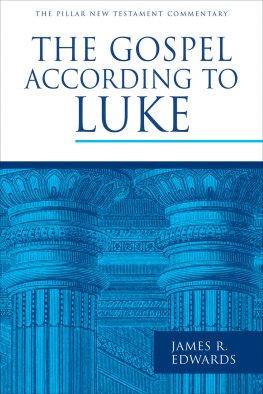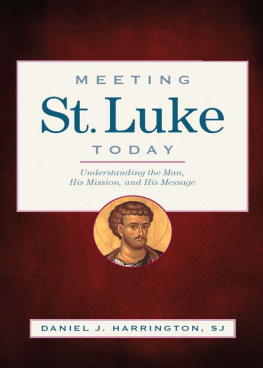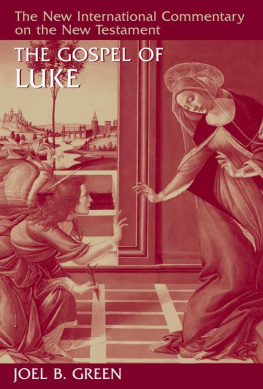Introduction
Who Is Luke?
A Companion of Pauls
T he middle of Acts 16 tells the mysterious, unprecedented and somewhat cryptic story of a portion of Pauls roundabout journey through the Roman province of Asia. It serves as a wonderful example of the benefits of engaging the text with the informed imagination and asking what the facts might mean. If you simply read Acts 16:6-8, you are left with a list of long-forgotten regions and cities. (It took me some time to find a map that listed all of the sites mentioned in the passage.) But once your mind is armed with the information on the map, you can trace this frustrating leg of what is commonly referred to as the second missionary journey. Then your heart just might engage with the story in a fresh way. So lets get started.
Paul and his companions had been traveling within the regions of Phrygia and Galatia, telling the good news about Jesus of Nazareth. When they wanted to travel west, into the Roman province of Asia (not Asia as we define it), the Holy Spirit kept them from doing so (Acts 16:6). Next we are told they set out to the north, in the direction of Mysia, hoping to enter the town of Bithynia, but the Spirit of Jesus would not allow them to (Acts 16:7). If you look at the map, youll see that the only way left for them to go was west, to the town of Troas. In other words, traveling west to Asia, the Spirit said, No. Then north to Mysia, Jesus said, No. In essence, they were being funneled to Troas. Once in Troas, Paul had a vision of a man from Macedonia (a region farther west, across the Aegean Sea, Acts 16:9). Acts 16:10 says that after the vision, we got ready to leave. This is the first of the we passages in Acts, and it indicates that the narrator of Acts had joined Pauls team. During that frustrating time of trying to go west and then north and then southwest to Troas, the Spirit was driving Paul, as it were, to the solitary man who would be his companion for the rest of his life. As they set out on this, their first missionary journey together, they never could have guessed just how deep their friendship would eventually become. The mans name was Luke.
In the letter to Philemon, Paul refers to Luke as simply one of his fellow workers (Philem 1:24 niv ). By the time he writes Colossians, Paul, in prison in Rome, mentions Luke again, next to Demas, but now he singles him out as our dear friend (Col 4:14 niv ). By the end of his life, Paul confesses in 2 Timothy 4:11 that only Luke is with me. Although we do not know that much about Luke, something tells me that this is all we really need to know. Luke had become his most faithful friend. Who is to say that he did not stay by Pauls side until the very end, perhaps claiming and caring for the decapitated body? So fact one concerning Luke is this: he was a companion of Paul .
Not an Eyewitness
In the opening verses of his Gospel, Luke indicates that he was not an eyewitness to the stories he is recording but has in fact spoken to those who from the first were eyewitnesses (Lk 1:2 niv ). Fact two concerning Luke: he was not an eyewitness . This means he had to self-consciously pick and choose which eyewitness accounts he would utilize as he wove together the story of Jesus.
A Doctor
Could it be that Paul simply needed a doctor to travel with him to help treat whatever his thorn in the flesh might have been? Some believe the mysterious ailment might have been progressive blindness. (At one point Paul speaks of having to write in such large letters [Gal 6:11].) Others think he might have suffered from malaria contracted on an earlier mission trip. Or could it have been that their mutual respect and concern for the marginal men and women of their time brought Paul and Luke together in ministry? Or was it the fact that they both cared so deeply for the universality of the gospel that their hearts resonated together with compassion for the Gentiles? Perhaps it was for all these reasons and others we may never know. In Colossians 4:14, Paul refers to Luke as an iatros , or doctor. Fact three concerning Luke: he was a doctor .
Perhaps a Slave
In Pauls day, many doctors were recruited from the slave community. So based on his profession, there is at least a chance that Luke might have been a slave. Whereas the Greeks forbade slaves to practice medicine, the Romans promoted the idea. In fact, even Augustuss personal physician was a freedman (former slave) named Antonius Musa. By the end of the first century, the emperor Domitian was forced to issue a decree that forbade any more slaves to study the
Another piece of evidence that points in the direction of Luke being a slave is his very name. Luke is technically known as a hypocorism, a fancy word for nickname. In the first century, slaves were usually renamed each time they were purchased. Some slave names bespeak qualities, like the name Onesimus, which means useful. Other slaves were given shortened forms of their masters names, or nicknames. Hence, a slave purchased by someone named Demetrius might receive the name Demos. If I were to have owned a slave in the first century (God forbid), I might have named him Mike. Likewise, someone named Lucius would have renamed his new slave Luke. I find it most interesting that Paul has a relative named Lucius (Acts 13:1; Rom 16:21). I admit that this idea is quite a stretch, and my scholarly friends have told me this theory would never wash in the halls of academia, but I suggest to you that Luke may have been a slave who was perhaps freed and given to Paul to serve him as his personal physician by his relative Lucius. We will look for more evidence for this later, but for now let us put forth, not as a fact but as a distinct possibility: Luke might have been a slave.
A Gentile
It is widely accepted that Luke was a Gentile. First, there is his Greek name. Then there is the fact that Paul first meets up with him in Asia. Also, a close look at the text of his Gospel indicates that he is writing to a Greek audience. In Colossians 4:10-17, Paul lists his co-workers. In verses 10-11 he names Aristarchus, Mark and Justus, mentioning that they are the only fellow workers who are of the circumcision, meaning they are the only Jews. In verses 12-17, Paul lists the other, presumably non-Jewish coworkers. In verse 14 he lists Luke, the loved physician. So Luke was a Gentile.
Here is where we stretch out and try to apply our method of engaging with the imagination. We have listed some facts and possible truths about Luke. Facts rest well in the mind, but our imaginations need to do something with the facts. So lets try to ask some better questions based on what we have seen so far. Lets try to interact with the facts at the level of the informed imagination.
If it is true that Luke was a companion of Pauls, then what would we expect from a companion of Pauls? Heres where it gets interesting.
First, Paul is not shy about confessing the fact that he was once a Pharisee (Acts 23:6; 26:5; Phil 3:5). When we come to the Gospel of Luke, we find that Luke deals with the Pharisees differently than the other Gospel writers do. In fact, in Lukes Gospel we see Jesus sharing meal fellowship with the Pharisees on three separate occasions (Lk 7:36; 11:37; 14:1). Only in Luke do the Pharisees come to warn Jesus about Herods plan to take his life (Lk 13:31). In the final chapters that record all that leads up to the crucifixion, we see that the Pharisees are not implicated in the plot. So what we might expect from the traveling companion of a Pharisee like Paul is exactly what we find. Luke has a broader perspective on the Pharisees.
Shortly after they first met (Acts 16), Paul and Luke set out on a journey. For the vast majority of the remainder of their time together they would be traveling. It is interesting then, when we turn to the Gospel of Luke, to see that 40 percent of the book, what is known as the great central section, records Jesus final journey to Jerusalem. It is also known as the travel narrative (Lk 9:5118:14). From the time he spent traveling with Paul, Luke seemed to understand the spiritual life as a journey. And so when he comes to tell the story of Jesus, he emphasizes Jesus final journey to Jerusalem. In fact, someone has said that Luke is simply the story of a journey from Galilee to Jerusalem, while Acts is the story of a journey from Jerusalem to Rome. So what we would expect to find from the traveling companion of Paul is exactly what we find in the Gospel of Luke.













